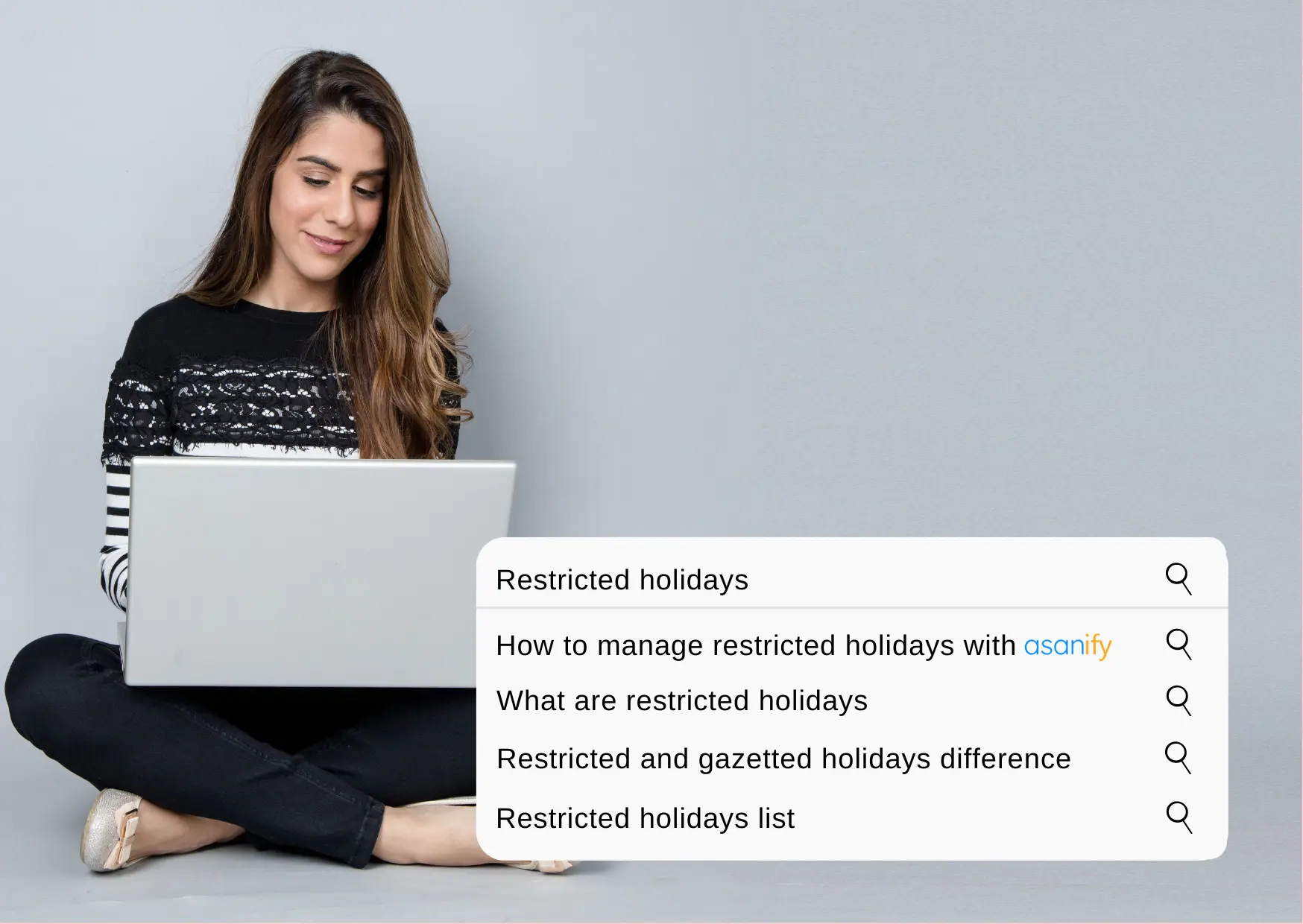After our previous blog on all the Holidays of the year 2023, we thought we should spend some time talking about restricted holidays. What is a restricted holiday and how does it affect any business? Are your employees entitled to restricted holidays? Is this the same as optional holidays?
These are just a few questions we have covered in this blog. We have also added a list of the restricted holidays for the year 2023 below. So keep reading!
- What is a restricted holiday?
- Difference between restricted holiday and gazetted holiday
- Are restricted, optional, floating, and flexi-holidays the same?
- Advantages/disadvantages of restricted holidays – How do restricted holidays affect your Company
- How many restricted holidays is an employee entitled to?
- Tips for building a policy around restricted holidays
- Is offering restricted holidays mandatory
- List of restricted holidays for the year 2023
- Summary
- FAQs
Download the 2023 Holiday Calendar PDF now!!!
Source: Official release by the Government of India
What is a restricted holiday?
A restricted holiday, same as an optional holiday, is basically a holiday that is optional. In simple terms, in companies, employees receive a list, for example, 10. They are allowed to pick and 4 up them as holidays and stay home without having to ace any pay cut.
Restricted holidays are those which are only observed by certain groups of people or organizations. They are not observed by the general public. These holidays are often specific to certain professions, such as government employees or schools.
Employees who work on restricted holidays may receive compensation or time off, whereas those who do not work on these days typically do not receive any special recognition. The location or industry of the company may determine which restricted holidays are available to employees.
Difference between restricted and gazetted holidays
A restricted holiday is a holiday that is designated by an organization for its employees, but employees are not necessarily entitled to take the day off. Gazetted holidays, on the other hand, are public holidays officially recognized and observed by the government in a country.
These holidays are listed in the official gazette and are typically observed by most businesses, schools, and public institutions, with many employees having the day off work. Examples of gazetted holidays include national holidays, religious holidays, and commemorative days.
Are restricted, optional, floating, and flexi-holidays the same?
Flexi-holidays
Flexi-holidays, also known as restricted, optional, floating and flexible holidays, are a type of holiday benefit offered by some employers to their employees. This type of holiday allows employees to take time off when they need it, subject to certain restrictions set by the employer. The restrictions may include a minimum number of days worked before taking time off or a maximum number of days that can be taken off at any one time.
How do restricted holidays affect your Company
The impact of restricted holidays on a company will depend on the specific circumstances and policies of the organization. It can result in some employees being required to work while others have the day off, which can affect productivity and morale. Sometimes, a large number of employees are required to work on a restricted holiday. This can put additional strain on the workforce and may lead to burnout and decreased job satisfaction.

Advantages
- Increased productivity: When employees have a limited number of holidays, they are more likely to be focused on work. This is because employees know that they have limited time off.
- Improved budget management: Companies can budget their resources more effectively. Why? Because they’ll know in advance how many employees will be off work and for how long.
- Reduced absenteeism: If employees have a limited number of holidays, they are less likely to take random holidays. This reduces the overall rate of absenteeism.
- Fair allocation: Restricted holidays can help to ensure that holiday time is fairly distributed among employees. So, on behalf of the employer, all employees get an even amount of time off.
- Improved workforce planning: Companies can plan their workforce more effectively, knowing in advance when employees will be off and adjusting schedules and staffing levels accordingly.
Disadvantages
- Confusion and uncertainty: There may be confusion about when employees are allowed to take time off. This could lead to scheduling difficulties and uncertainty about who will be available to work.
- Reduced productivity: Employees may take restricted holidays when they are needed most, (which may not be in line with the employer plans) leading to decreased productivity and increased workload for other employees. This however can be avoided with a proper holiday management system in place and prior planning done by the employer or manager
- Inequitable distribution: Without a clear system for managing restricted holidays, some employees may take more time off than others. Even though they are all entitled to the same number of holidays, some employees may take more holidays. This leads to an inequitable distribution of time off.
How many restricted holidays is an employee entitled to?
The number depends on the laws and regulations in the country or region where the employee works. It also depends on the company’s own policies and practices. In many countries, there is a legal minimum number of days that employers must provide as restricted holidays.
However, this can vary widely. For example, in the European Union, employers are required to provide a minimum of 20 paid vacation days per year. While in the United States, there is no federal law requiring employers to provide paid time off. Employers may also provide more time off than the legal minimum, either through collective bargaining agreements with unions or as a benefit for employees. It’s important to check the specific laws and regulations in your area, as well as the policies of your employer, to determine the number of restricted holidays you are entitled to.
In India, 3 National Holidays, 2 Restricted Holidays, and 14 Gazetted Holidays are available to them as time off.
Tips for building a policy around restricted holidays
Here are some tips for building a policy around optional holidays:
-
Clearly define what a restricted holiday is: Make sure that everyone in the organization understands what a restricted holiday is and how it differs from a regular holiday.
-
Determine which holidays will be restricted: Based on the needs of the business, determine which holidays will be designated as restricted and which will be full holidays.
-
Create a policy that is clear and precise so that employees know exactly how many restricted holidays they are entitled to.
-
Communicate the policy clearly: Once the policy has been established, make sure that it is communicated clearly to all employees so that everyone is aware of their rights and responsibilities.
-
Establish a fair and transparent process for determining who works on which restricted holidays: This can involve rotating schedules, allowing employees to volunteer to work, or let their managers know in advace which restricted holidays they will stay home for.
-
Provide adequate compensation: If employees are required to work on restricted holidays, consider offering extra pay or time off in lieu as compensation.
-
Review the policy regularly: Regularly review the policy to ensure that it is still meeting the needs of the business and employees, and make adjustments as needed.
By following these tips, companies can develop a fair and effective policy around holidays that benefits both the business and employees.
Is offering restricted holidays mandatory?
It depends on the company’s policies and the jurisdiction in which the company operates. Some countries and companies have laws and policies that require employers to offer certain days off as holidays. These include national holidays, while others may not. In such cases, it is up to the employer to decide whether or not to offer restricted holidays.
In India, the law requires employers to offer 2 restricted holidays. Apart from that, the Factories Act, of 1948 and the Shops and Establishment Act of various states require that workers be provided with a certain number of paid holidays.
The specific number of holidays required can vary depending on the state, industry, and type of establishment.
List of restricted holidays for the year 2023
As previously mentioned these holidays are optional, and employees can take these holidays based on their preference. It is not mandatory for any employer to close his/her organization. List of restricted holidays 2023.
|
Date |
Holiday |
|
1st January 2023 |
New Year’s Day |
|
14th January 2023 |
Makar Sankranti/Magha Bihu |
|
15th January 2023 |
Pongal |
|
26th January 2023 |
Basant Panchami/Sri Pancham |
|
5th February 2023 |
Hazarat Ali’s Birthday, Guru Ravidas’s Birthday |
|
15th February 2023 |
Swami Dayananda Saraswati Jayanti |
|
18th February 2023 |
Maha Shivaratri |
|
19th February 2023 |
Shivaji Jayanti |
|
7th March 2023 |
Holika Dahan, Dolyatra |
|
22nd March 2023 |
Chaitra Sukladi/ Gudi Padava/ Ugadi/ Cheti Chand |
|
9th April 2023 |
Easter Sunday |
|
14th April 2023 |
Vaisakhi/Vishu/Meshadi |
|
15th April 2023 |
Vaisakhadi (Bengal)/ Bahag Bihu (Assam) |
|
21st April 2023 |
Jamat-Ul-Vida |
|
9th May 2023 |
Guru Rabindranath’s Birthday |
|
20th June 2023 |
Rath Yatra |
|
16th August 2023 |
Parsi New Year’s day/ Nauraj |
|
20th August 2023 |
Vinayaka Chaturthi |
|
29th August 2023 |
Onam or Thiru Onam Day |
|
30th August 2023 |
Raksha Bandhan |
|
6th September 2023 |
Janmashtami (Smarta) |
|
19th September 2023 |
Ganesh Chaturthi |
|
21st October 2023 |
Dussehra (Saptami) |
|
22nd October 2023 |
Dussehra (Maha Ashtami) |
|
23rd October 2023 |
Dussehra (Maha Navmi) |
|
28th October 2023 |
Maharishi Valmiki’s Birthday |
|
1st November 2023 |
Karaka Chaturthi (Karva Chouth) |
|
12th November 2023 |
Naraka Chaturdasi |
|
13th November 2023 |
Govardhan Puja |
|
15th November 2023 |
Bhai Duj |
|
19th November 2023 |
Pratihar Sashthi or Surya Sashthi (Chhat Puja) |
|
24th November 2023 |
Guru Teg Bahadur’s Martyrdom Day |
|
24th December 2023 |
Christmas Eve |
Summary
Overall, restricted holidays are holidays that are recognized by the government but only a portion of the workforce is given the day off. Unlike gazetted holidays, where most businesses, schools, and public institutions are closed, employees are expected to work on restricted holidays.
The designation of a holiday as restricted is usually based on the needs of the business or industry. Certain industries or departments are deemed more critical and require employees to work. For example, the government (o private institutions) may require people in the healthcare sector, and workers in certain roles to work on holidays. This can happen while in other industries, employers may need only essential employees to work.
If an employer may need to compensate an employee who works on a restricted holiday with additional pay or time off. The specifics of this compensation will depend on the policies of the company and may vary by jurisdiction.
Having a clear and transparent policy can help to minimize any confusion or misunderstandings, and ensure that employees are aware of their rights and responsibilities.
FAQ
The number of restricted holidays that can be taken by an employee can vary depending on the policies of the company and the jurisdiction in which they work. There 2 is the minimum number of restricted holidays that an employee is entitled to, as the specifics of each holiday will depend on the needs of the business and the employees.
In many cases, the specifics of compensation for working on a restricted holiday will be outlined in the employee handbook or contract and may vary based on the employee’s role, level of seniority, or other factors.
RH is an abbreviation for “restricted holiday.” In the context of work, a restricted holiday is a public holiday that the government officially recognizes, but only a portion of the workforce takes the day off. Also, employers could compensate employees who work on a restricted holiday with additional pay or time off in lieu.
Gazetted holidays and restricted holidays are both recognized by the government as public holidays, but they differ. Gazetted holidays are holidays where most businesses, schools, and public institutions are closed, and employees are typically given the day off. Restricted holidays, on the other hand, are holidays where only a portion of the workforce takes the day off.
The status of Rakhi as a restricted holiday can vary depending on the state and jurisdiction in which you work. In some states, the government may not recognize Rakhi as a public holiday at all, while other governments may consider it a restricted holiday or even gazetted holiday
Not to be considered as tax, legal, financial or HR advice. Regulations change over time so please consult a lawyer, accountant or Labour Law expert for specific guidance.



